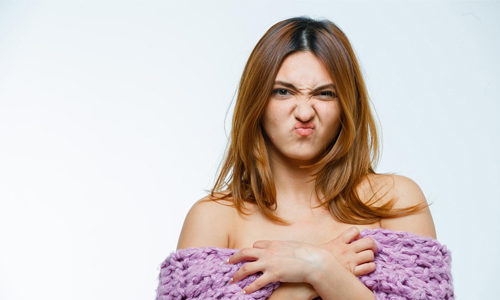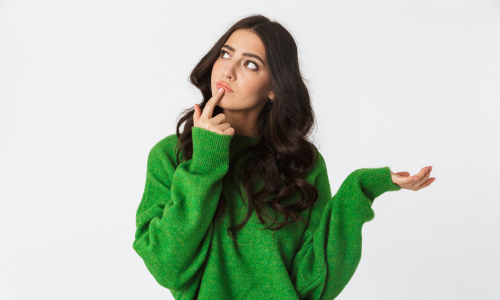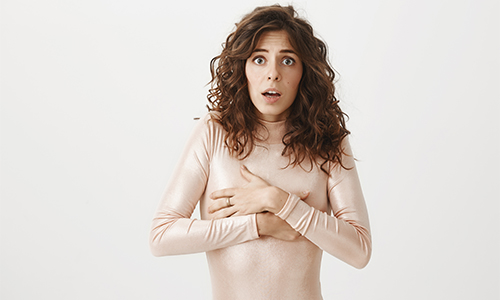Have you ever wondered what might cause itchiness in your breasts? There are numerous reasons that can worsen the condition. It can be uncomfortable, annoying, and sometimes even painful. It is crucial to identify the cause and address it promptly. Let’s examine some of the most common reasons for breast itching and explore effective ways to prevent them.
Some of the Most Common Reasons For Breast Itching

There are many reasons why breasts can itch, including puberty, hormonal changes, allergies, and even serious conditions, such as breast cancer. Addressing the issue promptly is essential, as neglecting it can lead to more severe complications. Here's a look at the most common causes of itching:
Some reasons are as follows:
1. Dry Skin
One of the most common reasons for breast itching is excessively dry skin. Some people naturally have dry skin, while for others, it may be caused by harsh chemicals, prolonged sun exposure, or continuous sweating. When the skin becomes too dry, it causes itchiness and discomfort in the affected area.
2. Growth
As breasts grow, the skin stretches, causing itchiness and discomfort. The hormonal changes during puberty, pregnancy or premenstrual syndrome can also make the skin more sensitive and reactive.
3. Allergies
Allergies are another common cause of itchiness in the breasts. While boob rashes may sometimes accompany the itchiness, this is not always the case. Soaps, detergents, cosmetic products, and perfumes are often responsible for allergic reactions to breast itching.
4. Heat Rashes
Heat rashes can cause itching under the breasts due to blocked sweat ducts. This condition traps perspiration, making the skin warm and damp, which triggers irritation.
5. Hormonal Changes
Itchy breasts can occur due to hormonal changes during menstruation, pregnancy, or menopause.
6. Yeast Infections
Yeast infections, also known as breast yeast or thrush, can cause itchy breasts. Symptoms include nipple tenderness, burning, itching, or stinging sensations.
7. Signs of Breast Cancer
If you notice a lump around your breast, redness, discolouration, swelling, or heavy and painful breasts, it is essential to consult a doctor immediately, as these could be signs of breast cancer.
Common Treatments for Breast Itching

Treatments for itchy breasts depend on the underlying cause and may include the following:
Use Skin-Friendly Skin-Care Products
Use fragrance-free, unscented products such as ceramide-containing creams, lotions, or petroleum jelly to moisturise the skin. Coconut oil, which has anti-fungal properties, can also be effective.
Clothing
Wear loose-fitting, breathable cotton bras. Avoid fabrics like silk, which can dry out the skin.
Oral Medications
Take antihistamines for severe itching or corticosteroids to reduce inflammation.
Phototherapy
Ultraviolet light therapy using special lamps can help relieve symptoms of eczema.
Home Remedies
Place a warm washcloth over the rash for a few minutes, several times a day. You can also apply a small compress or cotton square before wearing your bra to minimise rubbing.
Avoid Harsh Skin Products
Avoid substances like soaps or lotions that may trigger symptoms.
Tips for Managing and Preventing Breast Itching
Explore these helpful tips and remedies to manage, prevent, and soothe itching for long-term relief.
1. When to See a Doctor: Red Flags to Watch For
If the itching lasts more than a week or is paired with unusual symptoms like lumps or pain, it's time to see a doctor.
2. Preventing Breast Itching: Simple Tips
Regularly moisturizing and wearing comfortable clothing can help prevent itching from happening in the first place.
3. Natural Remedies
Applying aloe vera or coconut oil to the affected area can provide natural relief from itchy breasts.
4. The Connection Between Diet and Skin Health
Eating foods rich in omega-3s, like salmon, and staying hydrated may help reduce skin irritation and prevent dryness.
5. Other Skin Conditions That Cause Breast Itching
Conditions like eczema or psoriasis can lead to itching. These need specific treatment.
6. Managing the Emotional Impact
If your breast itching is affecting your emotional well-being, try practicing relaxation techniques or talking to a support group for help.
It can be caused by various factors, including dryness, allergies, or even underboob rash. If you suspect an underboob rash is causing your discomfort, check out our expert guide on How to Treat Underboob Rash? for the best remedies!
FAQs
1. When should I be worried about breast itching?
You should be concerned about breast itching if it is intense and persists for more than a week.
2. What is the main cause of itchy breasts?
Some possible causes of breast itchiness include dry skin, breast growth, and allergens.
3. What is breast cancer itching like?
A rash that looks like an insect bite or a bruise. Swelling or firmness takes place, typically in one breast. Persistent itching, and pain, also occur in the particular area.
4. What are the five warning signs of breast cancer?
- A new lump in the breast or underarm
- Redness, dimpling, swelling, or thickening of the skin of the breast or nipple area
- Pain in any area of the breast
- A change in the size or shape of the breast
5. Does itchy breast mean period?
Yes, itchy breasts can be a symptom of premenstrual syndrome (PMS), a common condition that affects most people who menstruate.
6. Why is it important to wear a clean, correctly sized bra every day?
Wearing a clean, correctly sized bra prevents skin irritation, reduces itching, and ensures proper support, helping to keep your breasts comfortable and healthy.
7. Does wearing a bra while sleeping cause breast itchiness?
Avoid wearing a bra while sleeping to reduce itchiness, as it allows your skin to breathe and prevents unnecessary friction.

